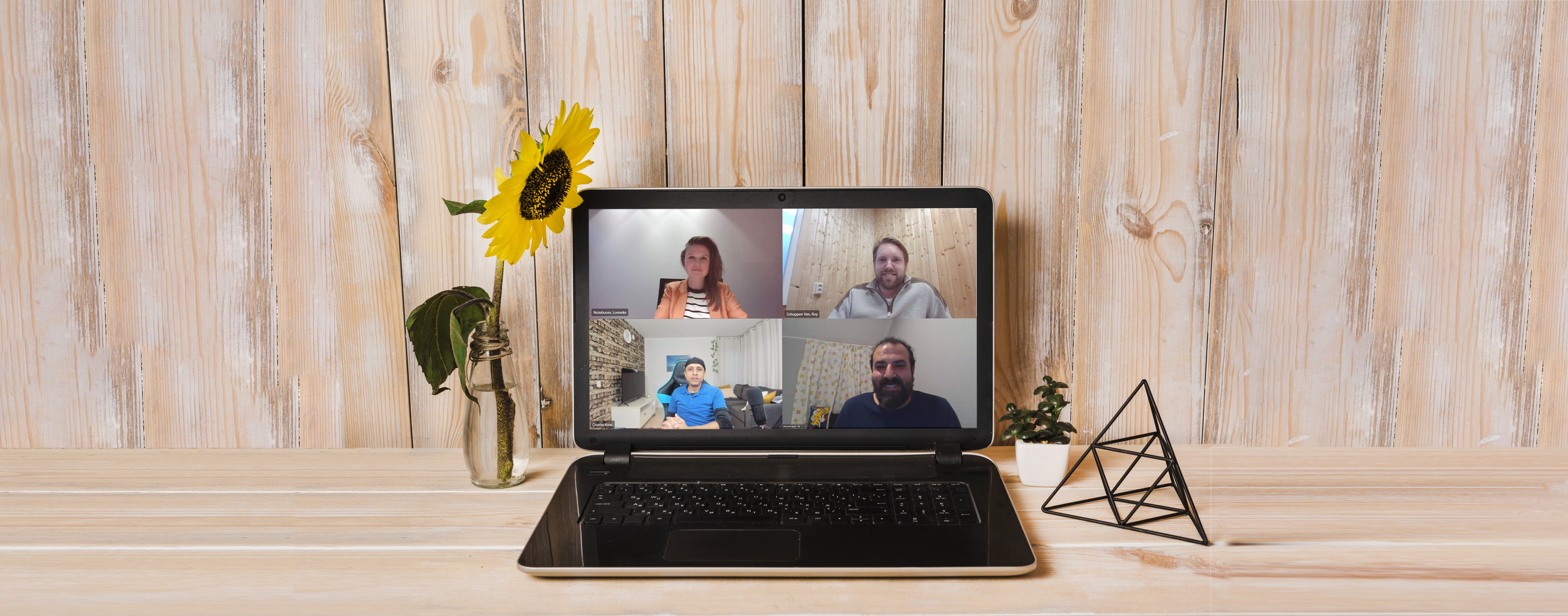
Reading time 5 minutes
Shelter programme: language, culture and a helping hand
Is it easier to really see people and their needs if you have a refugee background yourself? We talked to Moustafa and Isaac (two volunteers at Kennemerland), Lonneke (Shelter Programme project leader) and Roy (managing two shelters in Kennemerland).
The Netherlands Red Cross provides about forty centres across the Netherlands for asylum seekers and Ukrainian displaced persons. Volunteers and staff members support these centres. As a host or hostess, offering first aid, location coordinators and managers, people to talk to. Isaac is one of those volunteers and a former resident of an emergency shelter called De Beijneshal in Haarlem. Due to strict censorship, the university lecturer and publicist from Yemen had no option but to start all over again in the Netherlands. Spending time at various shelters, one thing became clear. The uncertainty of waiting for the next step is paralyzing for many people. Teaching runs in his blood, he can make a difference. Isaac now lives on his own.
Wasting time
Isaac: “People often wait for months without being able to do anything. It's literally a waste of time. If you don't speak English or Dutch, it is also very difficult to make any progress. I was able to organise lessons through the Netherlands Red Cross. I didn't need much, a laptop got me very far. As a resident of the crisis shelter, I was looking for what I needed to know to build a life in the Netherlands. I now share everything I’ve learned about language, culture and rules.”
Isaac:
“I now share everything I’ve learned about the Netherlands...”
Roy comments: “Because Isaac was a resident himself, he understands better than anyone what is going on. On the one hand, there is laziness and on the other hand the potential of all the knowledge and skills out there. What residents can organise together, represents major added value. They understand the daily uncertainties and frustrations, but they also share hope and expectations. As a result, they can be a great support for each other.”
Roy:
“What residents can organise together, represents major added value...”
Beautiful melange
Lonneke comments: “Resident’s voluntary initiatives, make things different. “We are perfectly happy to facilitate these initiatives. Combined with the support of the housing supervisors of the Netherlands Red Cross, a beautiful melange is the result. I hope we can do this at many more centres with new Dutch people who want to volunteer for the Netherlands Red Cross. We realise only too well it takes a lot to make this happen. For example, a welcome programme for volunteers with a refugee background, even if they do not yet speak the language. We are discussing this with the volunteers’ department and the Red Cross Academy.”
It’s the helping hand that counts...
According to Moustafa, the first year in the Netherlands in particular determines how people feel about their new homeland. He fled the war in Syria back in 2014 and came to the Netherlands. Today he is a housing supervisor for the Netherlands Red Cross. The road people follow to feel at home and blend in is extremely important to him. Moustafa now lives on his own. “I have personally experienced how important it is to feel welcome. Our team is about action, not words. By showing newcomers that we care. And yes, understanding what they're going through and where they're coming from really makes a difference. I speak both Kurdish and Arabic, which is an asset. Many people do not speak English, let alone Dutch. So, residents quickly come to me with their questions. But in the end, it's about the helping hand that makes them feel good about themselves. Even if you don't share the same background or the same language.”
Moustafa:
“Understanding what they’re going through and where they come from makes a difference...”
Interesting and painful luggage
Isaac: “Do whatever you can, wherever you may be, using the tools available. I totally believe in that. We were able to develop many initiatives at Beijneshal sports complex. Cooking, working out, crafting, creating art, learning Dutch and English, understanding culture. Some of the centres I’ve been to are different, with no room to develop. Here, the Netherlands Red Cross asked us: what do you need? Then they helped us on the way. It is extremely important, accepting people just the way they are, understanding that they have come with quite some luggage. Interesting and yet painful luggage at the same time.” “So, making the Dutch truly understand the situation is extremely important,” Moustafa believes. “Newcomers aren’t perfect. They’ve been through a lot. They have issues. We have to understand that. But at the same time, they bring in knowledge and experience, to make Dutch culture even richer and the more interesting. We really need to keep that in mind.”
Monitoring people’s needs more effectively
Lonneke: “We see the impact of volunteers who bring in their own experience, language and background, like Isaac and Moustafa. We monitor residents’ needs more effectively by talking to them. We also consult with residents' councils on a weekly basis. Working with experts helps us monitor needs more effectively.”
Roy: “In the end, it’s a team effort. Residents, volunteers, professionals, staff at shelter centres. Provided there is mutual respect, and you are open to each other's background and needs, the sky is the limit.”